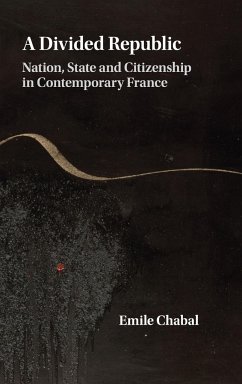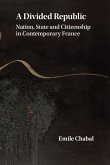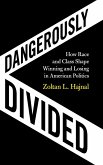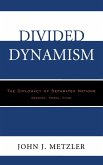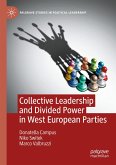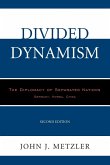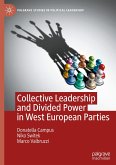Emile Chabal
A Divided Republic
Emile Chabal
A Divided Republic
- Gebundenes Buch
- Merkliste
- Auf die Merkliste
- Bewerten Bewerten
- Teilen
- Produkt teilen
- Produkterinnerung
- Produkterinnerung
A bold interpretation of contemporary French political culture that uses current political debates to understand how the French engage with politics.
Andere Kunden interessierten sich auch für
![A Divided Republic A Divided Republic]() Emile ChabalA Divided Republic37,99 €
Emile ChabalA Divided Republic37,99 €![Ukraine Over the Edge Ukraine Over the Edge]() Gordon M. HahnUkraine Over the Edge44,99 €
Gordon M. HahnUkraine Over the Edge44,99 €![Dangerously Divided Dangerously Divided]() Zoltan L. HajnalDangerously Divided79,99 €
Zoltan L. HajnalDangerously Divided79,99 €![Divided Dynamism Divided Dynamism]() John J. MetzlerDivided Dynamism110,99 €
John J. MetzlerDivided Dynamism110,99 €![Collective Leadership and Divided Power in West European Parties Collective Leadership and Divided Power in West European Parties]() Donatella CampusCollective Leadership and Divided Power in West European Parties149,79 €
Donatella CampusCollective Leadership and Divided Power in West European Parties149,79 €![Divided Dynamism Divided Dynamism]() John J. MetzlerDivided Dynamism56,99 €
John J. MetzlerDivided Dynamism56,99 €![Collective Leadership and Divided Power in West European Parties Collective Leadership and Divided Power in West European Parties]() Donatella CampusCollective Leadership and Divided Power in West European Parties104,99 €
Donatella CampusCollective Leadership and Divided Power in West European Parties104,99 €-
-
-
A bold interpretation of contemporary French political culture that uses current political debates to understand how the French engage with politics.
Hinweis: Dieser Artikel kann nur an eine deutsche Lieferadresse ausgeliefert werden.
Hinweis: Dieser Artikel kann nur an eine deutsche Lieferadresse ausgeliefert werden.
Produktdetails
- Produktdetails
- Verlag: Cambridge University Press
- Seitenzahl: 314
- Erscheinungstermin: 30. Oktober 2015
- Englisch
- Abmessung: 235mm x 157mm x 21mm
- Gewicht: 608g
- ISBN-13: 9781107061514
- ISBN-10: 1107061512
- Artikelnr.: 42284654
- Herstellerkennzeichnung
- Libri GmbH
- Europaallee 1
- 36244 Bad Hersfeld
- gpsr@libri.de
- Verlag: Cambridge University Press
- Seitenzahl: 314
- Erscheinungstermin: 30. Oktober 2015
- Englisch
- Abmessung: 235mm x 157mm x 21mm
- Gewicht: 608g
- ISBN-13: 9781107061514
- ISBN-10: 1107061512
- Artikelnr.: 42284654
- Herstellerkennzeichnung
- Libri GmbH
- Europaallee 1
- 36244 Bad Hersfeld
- gpsr@libri.de
Emile Chabal was educated at the University of Cambridge, Rice University, Houston, Harvard University, Massachusetts and the École Normale Supérieure, Paris. He completed his PhD at Cambridge and his thesis was subsequently awarded the History Faculty's Prince Consort and Thirlwall Prize, and Seeley Medal for the best dissertation across all periods. Immediately after completing his doctorate, Chabal took up a position as Departmental Lecturer in Modern European History in the Faculty of History and Balliol College, Oxford. He returned to Cambridge in 2012 as a Research Fellow in French Political History at St John's College. In 2013, he moved to the University of Edinburgh as a Chancellor's Fellow in History. his research has, for the most part, touched on three main areas: the transformation of French politics since the 1970s, Franco-British relations in the twentieth century and the legacy of postcolonialism in France. This has resulted in a number of publications on subjects ranging from the 'Anglo-Saxon' in modern French thought to contemporary French conceptions of the nation, the citizen and the secular. Chabal has also worked on political counter-narratives in France, including liberal reinterpretations of modern French history, theories of multiculturalism and the politics of postcolonialism. More recently, he has turned his attention to French neo-liberalism and anti-liberalism, and he has an ongoing project that looks at identity politics, clientelism and the history of inter-community relations in Montpellier since the end of the Algerian War. All of this research has sought to elaborate imaginative new frameworks for understanding contemporary political culture in France and Europe.
Introduction: French politics after the deluge
Part I. Writing the National Narrative in Contemporary France: The Return of Republicanism: 1. Writing histories: two republican narratives
2. From nouveaux philosophes to nouveaux réactionnaires: Marxism and the Republic
3. La République en danger! The search for consensus and the rise of neo-republican politics
4. Postcolonies I: integration, disintegration and citizenship
5. The Republic, the Anglo-Saxon and the European project
Part II. Liberal Critics of Contemporary France: Le Libéralisme Introuvable?: 6. In the shadow of Raymond Aron: the 'liberal revival' of the 1980s
7. Rewriting Jacobinism: François Furet, Pierre Rosanvallon and modern French history
8. Postcolonies II: the politics of multiculturalism and colonial memory
9. Whither the Trente Glorieuses? The language of crisis and the reform of the state
10. Liberal politics in France: a story of failure?
Conclusion: political consensus in twenty-first-century France
Bibliography
Index.
Part I. Writing the National Narrative in Contemporary France: The Return of Republicanism: 1. Writing histories: two republican narratives
2. From nouveaux philosophes to nouveaux réactionnaires: Marxism and the Republic
3. La République en danger! The search for consensus and the rise of neo-republican politics
4. Postcolonies I: integration, disintegration and citizenship
5. The Republic, the Anglo-Saxon and the European project
Part II. Liberal Critics of Contemporary France: Le Libéralisme Introuvable?: 6. In the shadow of Raymond Aron: the 'liberal revival' of the 1980s
7. Rewriting Jacobinism: François Furet, Pierre Rosanvallon and modern French history
8. Postcolonies II: the politics of multiculturalism and colonial memory
9. Whither the Trente Glorieuses? The language of crisis and the reform of the state
10. Liberal politics in France: a story of failure?
Conclusion: political consensus in twenty-first-century France
Bibliography
Index.
Introduction: French politics after the deluge
Part I. Writing the National Narrative in Contemporary France: The Return of Republicanism: 1. Writing histories: two republican narratives
2. From nouveaux philosophes to nouveaux réactionnaires: Marxism and the Republic
3. La République en danger! The search for consensus and the rise of neo-republican politics
4. Postcolonies I: integration, disintegration and citizenship
5. The Republic, the Anglo-Saxon and the European project
Part II. Liberal Critics of Contemporary France: Le Libéralisme Introuvable?: 6. In the shadow of Raymond Aron: the 'liberal revival' of the 1980s
7. Rewriting Jacobinism: François Furet, Pierre Rosanvallon and modern French history
8. Postcolonies II: the politics of multiculturalism and colonial memory
9. Whither the Trente Glorieuses? The language of crisis and the reform of the state
10. Liberal politics in France: a story of failure?
Conclusion: political consensus in twenty-first-century France
Bibliography
Index.
Part I. Writing the National Narrative in Contemporary France: The Return of Republicanism: 1. Writing histories: two republican narratives
2. From nouveaux philosophes to nouveaux réactionnaires: Marxism and the Republic
3. La République en danger! The search for consensus and the rise of neo-republican politics
4. Postcolonies I: integration, disintegration and citizenship
5. The Republic, the Anglo-Saxon and the European project
Part II. Liberal Critics of Contemporary France: Le Libéralisme Introuvable?: 6. In the shadow of Raymond Aron: the 'liberal revival' of the 1980s
7. Rewriting Jacobinism: François Furet, Pierre Rosanvallon and modern French history
8. Postcolonies II: the politics of multiculturalism and colonial memory
9. Whither the Trente Glorieuses? The language of crisis and the reform of the state
10. Liberal politics in France: a story of failure?
Conclusion: political consensus in twenty-first-century France
Bibliography
Index.

